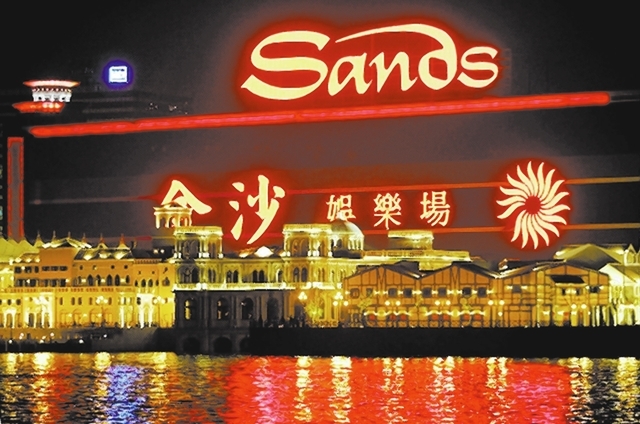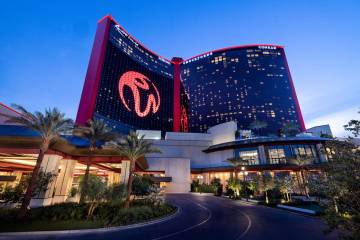Boom time in Macau continues to buoy Las Vegas Sands
The Venetian and Palazzo on the Strip provided Las Vegas Sands Corp. with somewhat lackluster revenues in the third quarter.
Wall Street didn’t give the results much attention.
Macau is what drives Las Vegas Sands.
In the three months ended Sept. 30, the company’s four major Macau gaming divisions produced a 43 percent increase in revenues and an 89 percent jump in profits compared with a year ago. The overall net revenues from Macau during the quarter — $2.34 billion — accounted for more than 65 percent of Las Vegas Sands’ companywide total of $3.57 billion.
And it will only continue to grow.
“(Las Vegas Sands) remains predominantly a China secular-driven story,” Macquarie Securities gaming analyst Chad Beynon said. “In our view, Las Vegas Sands remains the best Asian gaming growth and cash flow investment story.”
Beynon wasn’t alone in that thought.
JP Morgan gaming analyst Joe Greff said the Macau market — which many analysts predict will surpass a single-month gaming revenue record when October concludes — shows no signs of slowing.
“We continue to like the Macau gaming sector overall, driven by attractive marketwide revenue growth, particularly in the mass gaming segment,” Greff said. “Las Vegas Sands’ hotel room base should allow (the company) to grow top line and (cash flows) in excess of the market participants.”
Las Vegas Sands is spending $2.7 billion to build a 3,000-room Parisian-themed hotel-casino on Macau’s Cotai Strip region. The development is expected to open by the end of 2015.
Analysts said the property would complement the company’s existing Venetian Macau, the multiple-hotel Sands Cotai Central development, the Four Seasons Macau and the Sands Macau, which is in the peninsula area.
During an Oct. 17 conference call with analysts and investors, Rob Goldstein, Las Vegas Sands’ president of global gaming operations, said visitation from mainland Chinese residents outside Macau’s neighboring Guangdong province had increased, which provides additional revenues beyond the gaming tables.
“With our room base, that’s a very positive thing for us,” Goldstein said. “They stay longer, come from further away and require sleeping rooms. So Sheldon’s (Adelson) 9,000 sleeping rooms in Cotai turned out to be a pretty good idea.”
Adelson, Las Vegas Sands’ 80-year-old chairman and CEO, told investors the company will be the largest benefactor of infrastructure improvements that are bringing more visitors into Macau from both mainland China and through Hong Kong. The opening of the $10 billion Hong Kong-Macau-Zhuhai Bridge in 2016 will slice the drive time it takes for visitors to reach Macau by 40 minutes.
Susquehanna International Group gaming analyst Rachael Rothman said the increases in visitation from several regions of mainland China is “an important inflection that underscores the importance of the infrastructure build-out in greater China that continues to increase Macau’s reach.”
In Las Vegas, The Venetian and Palazzo said casino revenues during the third quarter fell 2 percent, largely because of decreased baccarat play. The resorts’ 7,000 hotel rooms provided a 5 percent rise in revenues while food- and-beverage sales jumped more than 22 percent. Overall, revenues for the company’s Strip market increased 2.9 percent.
Union Gaming Group Managing Director Bill Lerner said reliance on convention business from the Sands Expo and Convention Center during the quarter caused table game wagering to decrease in the casino.
“The higher percentage of rooms to conventioneers versus casino players likely weighed on table games play,” Lerner said. “In addition, there seems be less clarity on when large players come into town.”
The company’s success in Macau leads many analysts to believe Las Vegas Sands would be a leading candidate should Japan open up to gaming. The country was awarded the 2020 Summer Olympics and tax revenues from casinos could fund the building of Olympic venues.
Las Vegas Sands President Michael Leven said estimates peg Japan as a $6 billion-a-year gaming market, which would equal annual revenues from the Strip. Macau produced an industry-high $38 billion in gaming revenues in 2012 and the market is up 17 percent through September.
“Japan would obviously be the most expensive investment we’ve ever made from a single-property standpoint,” Leven said.
How comfortable is Las Vegas Sands in its current financial position? The company hasn’t had a permanent chief financial officer since Kenneth Kay departed at the end of July. When asked about a replacement, Leven said a formal search for a new CFO has not commenced and probably won’t until early 2014.
“We’re moving along the same way we’ve been organized for the last four months,” Leven said.

















